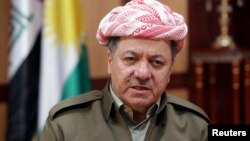BAGHDAD —
The president of Iraqi Kurdistan, Masoud Barzani, visited Baghdad on Sunday for the first time in more than two years, in a symbolic step to resolve disputes between the central government and the autonomous region over land and oil.
The visit follows an equally rare trip by Iraqi Prime Minister Nuri al-Maliki who met Barzani in Kurdistan last month, breaking ice between leaders who have repeatedly accused each other of violating the constitution.
There was no breakthrough then or on Sunday, but Barzani described himself and Maliki as ``brothers'' and said they had agreed to "reactivate" committees previously formed to try to resolve their long-running disputes.
"True, there are problems and different orientations ... but we have a constitution to refer back to as a reference to agree on appropriate solutions, and now there is a real will to resolve the problems," said Barzani at a joint news conference.
The constitution itself is a source of contention, because the two sides interpret it differently and disagree on the extent to which power should be centralized in Baghdad or devolved to the provinces.
The last time Barzani was in Baghdad was in 2010, during protracted negotiations that eventually produced the "Arbil agreement", under which a power-sharing central government was formed between Shi'ite Muslims, Sunnis and ethnic Kurds.
That bargain, like others thereafter, was never fully implemented, and the central government in Baghdad and the Kurdish region have since been at odds over oil and disputed territories along their internal boundary.
In recent years, the Kurds have signed contracts on their own terms with the likes of Exxon Mobil, Total and Chevron Corp, antagonizing Baghdad, which says it alone has the authority to control exploration and export of Iraq's oil.
A decade after the U.S. led-invasion that toppled former dictator Saddam Hussein, legislation to govern the world's fourth largest crude reserves remains caught up in Iraq's deadlocked parliament.
In the meantime, the Kurds have passed their own oil and gas law and are currently laying the final stretch of an independent export pipeline to Turkey that could reduce their reliance on Baghdad for a share of the national budget.
Better relations with the Kurds would help insulate Maliki from the fallout from the civil war in neighboring Syria, which has inflamed sectarian tensions in Iraq and spurred Sunni insurgents to take on the Shi'ite-led central government.
Shi'ite lawmakers and analysts said a rapprochement was of mutual interest to Barzani and Maliki, who are both under pressure from domestic opposition and instability spilling over from Syria.
"Arbil needs Baghdad and Baghdad needs Arbil. If Barzani can't get rid of Maliki, the only option is to work with him," said Ramzy Mardini at the Beirut-based Iraq Institute for Strategic Studies. "As long as Arbil is financially dependent on Baghdad, there's no other way around it. Luckily for Barzani, Maliki needs his cooperation for the moment too."
The visit follows an equally rare trip by Iraqi Prime Minister Nuri al-Maliki who met Barzani in Kurdistan last month, breaking ice between leaders who have repeatedly accused each other of violating the constitution.
There was no breakthrough then or on Sunday, but Barzani described himself and Maliki as ``brothers'' and said they had agreed to "reactivate" committees previously formed to try to resolve their long-running disputes.
"True, there are problems and different orientations ... but we have a constitution to refer back to as a reference to agree on appropriate solutions, and now there is a real will to resolve the problems," said Barzani at a joint news conference.
The constitution itself is a source of contention, because the two sides interpret it differently and disagree on the extent to which power should be centralized in Baghdad or devolved to the provinces.
The last time Barzani was in Baghdad was in 2010, during protracted negotiations that eventually produced the "Arbil agreement", under which a power-sharing central government was formed between Shi'ite Muslims, Sunnis and ethnic Kurds.
That bargain, like others thereafter, was never fully implemented, and the central government in Baghdad and the Kurdish region have since been at odds over oil and disputed territories along their internal boundary.
In recent years, the Kurds have signed contracts on their own terms with the likes of Exxon Mobil, Total and Chevron Corp, antagonizing Baghdad, which says it alone has the authority to control exploration and export of Iraq's oil.
A decade after the U.S. led-invasion that toppled former dictator Saddam Hussein, legislation to govern the world's fourth largest crude reserves remains caught up in Iraq's deadlocked parliament.
In the meantime, the Kurds have passed their own oil and gas law and are currently laying the final stretch of an independent export pipeline to Turkey that could reduce their reliance on Baghdad for a share of the national budget.
Better relations with the Kurds would help insulate Maliki from the fallout from the civil war in neighboring Syria, which has inflamed sectarian tensions in Iraq and spurred Sunni insurgents to take on the Shi'ite-led central government.
Shi'ite lawmakers and analysts said a rapprochement was of mutual interest to Barzani and Maliki, who are both under pressure from domestic opposition and instability spilling over from Syria.
"Arbil needs Baghdad and Baghdad needs Arbil. If Barzani can't get rid of Maliki, the only option is to work with him," said Ramzy Mardini at the Beirut-based Iraq Institute for Strategic Studies. "As long as Arbil is financially dependent on Baghdad, there's no other way around it. Luckily for Barzani, Maliki needs his cooperation for the moment too."




